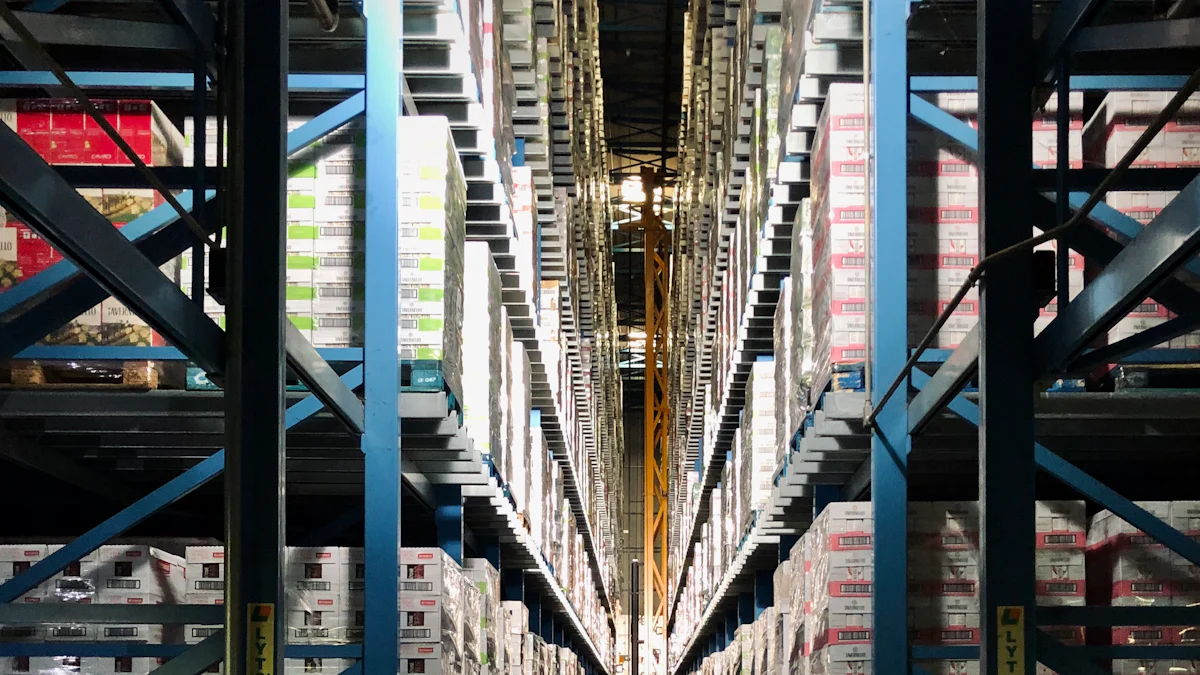Navigating Change: Adapting to Tech-Driven Supply Chain Solutions

In the realm of supply chain management, the Big Data Supply Chain Solutions have revolutionized operational efficiency. Embracing technological advancements is paramount for companies seeking to thrive in a dynamic market landscape. Leveraging big data analytics enables organizations to enhance demand forecasts, optimize inventories, and streamline logistics planning. As highlighted by the World Economic Forum, 84% of companies implementing IoT technologies witness substantial efficiency gains. The digital supply chain era demands proactive adaptation to tech-driven solutions for sustainable growth and resilience.
Big Data Supply Chain Solutions

In the realm of supply chain management, Big Data Supply Chain Solutions play a pivotal role in revolutionizing operational efficiency. The utilization of big data and predictive analytics has become a cornerstone for enhancing visibility, decision-making, and overall efficiency in supply chain management. By embracing these advanced technologies, companies can achieve accurate demand forecasting, optimize inventory levels, streamline logistics processes, and identify potential bottlenecks and risks.
Role of Big Data
Improving Demand Forecasts
Implementing Big Data Supply Chain Solutions enables organizations to significantly enhance their demand forecasting capabilities. Through the analysis of vast datasets and historical trends, companies can accurately predict future demands. This accurate forecasting not only helps in meeting customer needs promptly but also aids in optimizing inventory levels to prevent overstocking or shortages.
Reducing Safety Stock
One of the key benefits of leveraging big data in supply chain management is the ability to reduce safety stock levels. By utilizing advanced analytics tools, companies can gain insights into demand patterns and fluctuations. This insight allows businesses to maintain optimal inventory levels without the need for excessive safety stock, thereby reducing holding costs and improving overall operational efficiency.
Enhancing Supplier Management
Data-Driven Supplier Selection
The integration of big data analytics in supplier management facilitates data-driven decision-making processes. Companies can evaluate supplier performance based on real-time data analysis rather than relying on traditional methods. This approach not only enhances transparency but also ensures that suppliers align with the organization's strategic goals and standards.
Performance Monitoring
Through continuous monitoring and analysis of supplier performance metrics, organizations can proactively identify areas for improvement. Big data enables companies to track key performance indicators (KPIs) in real-time, allowing for timely interventions when deviations occur. This proactive approach fosters stronger supplier relationships and promotes a culture of continuous improvement within the supply chain ecosystem.
Optimizing Inventories
Inventory Management Techniques
Big data-driven inventory management techniques empower organizations to optimize their inventory levels effectively. By analyzing historical sales data, market trends, and other relevant factors, businesses can fine-tune their inventory strategies. This optimization ensures that products are available when needed while minimizing excess stock that ties up capital unnecessarily.
Real-Time Data Utilization
Real-time data utilization is a game-changer in modern supply chain management practices. By harnessing real-time insights from various sources such as IoT devices and sensors, companies can make informed decisions instantaneously. This agility allows organizations to respond swiftly to changing market conditions and customer demands, ultimately enhancing operational efficiency.
Digital Supply Chains
Real-Time Data
In the realm of supply chain management, AI-based forecasts are revolutionizing the way companies predict future demands. By leveraging artificial intelligence algorithms, organizations can analyze historical sales data, seasonality patterns, and external factors to generate accurate forecasts. According to a study on AI applications in supply chain management, these advanced algorithms play a crucial role in enhancing demand forecasting accuracy. Companies that implement AI-driven forecasting models can achieve up to a 50% reduction in forecasting errors, leading to improved inventory management and customer satisfaction.
Enhanced decision-making is a key benefit of integrating AI technologies into supply chain operations. By utilizing machine learning models for demand forecasting, companies can make data-driven decisions based on internal datasets, customer orders, and external signals. These AI-ML models not only improve forecasting accuracy but also enable organizations to adapt quickly to changing market conditions. With the ability to analyze vast amounts of data rapidly, businesses can optimize their inventory levels, reduce costs, and enhance overall operational efficiency.
Logistics Planning
Predictive maintenance is transforming logistics planning by enabling proactive equipment maintenance strategies. Through the analysis of real-time data from IoT devices and sensors, companies can predict when machinery or vehicles are likely to fail. This predictive capability allows organizations to schedule maintenance activities before breakdowns occur, minimizing downtime and optimizing operational performance. By implementing predictive maintenance solutions, businesses can reduce maintenance costs, extend asset lifecycles, and ensure continuous workflow efficiency.
Fuel Cost Optimization
Fuel cost optimization plays a critical role in logistics planning for companies seeking to streamline transportation operations. By leveraging real-time data analytics and route optimization algorithms, organizations can minimize fuel consumption and reduce carbon emissions. According to recent studies on fuel cost optimization strategies, companies that implement data-driven approaches witness significant savings in fuel expenses while improving delivery timelines. Through efficient route planning and vehicle utilization, businesses can achieve sustainable practices and cost-effective logistics operations.
Agile Supply Chain Solutions

In the realm of supply chain management, Agile Supply Chain Solutions stand out as a transformative approach to adapting to dynamic market conditions. Embracing agility in planning and execution is essential for companies aiming to enhance operational flexibility and responsiveness. By leveraging self-adaptive planning strategies, organizations can proactively prevent network decoupling issues and ensure seamless logistics operations.
Self-Adaptive Planning
Implementing self-adaptive planning methodologies empowers companies to anticipate and address disruptions effectively. By continuously monitoring supply chain dynamics and performance metrics, businesses can adjust their strategies in real-time to mitigate risks and maintain operational continuity. This proactive approach not only minimizes the impact of unforeseen events but also fosters a culture of resilience within the organization.
Preventing Network Decoupling
Preventing network decoupling is a critical aspect of agile supply chain management. By optimizing communication channels and information flow across the supply chain network, companies can enhance collaboration and coordination among stakeholders. This integrated approach ensures that all parties are aligned with strategic objectives and work towards common goals. Through effective network management, organizations can reduce delays, errors, and inefficiencies in their operations.
Efficient Logistics Operations
Efficient logistics operations are at the core of agile supply chain solutions. By streamlining transportation processes, route planning, and inventory management, companies can achieve cost savings and service excellence. Leveraging real-time data analytics for demand forecasting and resource allocation enables businesses to optimize their logistics operations efficiently. This data-driven approach enhances visibility into the entire supply chain ecosystem, allowing for informed decision-making and continuous improvement initiatives.
Global Logistics
In the context of global trade, global logistics present unique challenges and opportunities for companies expanding their reach across borders. Leveraging agile supply chain solutions in global logistics management is crucial for overcoming complexities associated with international trade regulations, customs procedures, and cultural differences. By focusing on improved information utilization and operational efficiencies, organizations can navigate global markets with confidence and competitiveness.
Improved Information Utilization
Enhanced information utilization is a key driver of success in global logistics operations. By harnessing data analytics tools and technologies, companies can gain valuable insights into market trends, consumer behavior, and competitor activities on a global scale. This information empowers decision-makers to make informed choices regarding product distribution, inventory levels, pricing strategies, and risk mitigation measures. Through effective information utilization practices, organizations can stay ahead of the curve in an increasingly interconnected world.
Operational Efficiencies
Achieving operational efficiencies is paramount for sustainable growth in global logistics environments. By optimizing processes such as order fulfillment, warehousing, transportation management, and customs clearance procedures, companies can reduce lead times and costs while improving service quality. Implementing lean principles and continuous improvement initiatives fosters a culture of efficiency within the organization. This results in streamlined operations that meet customer demands promptly while maintaining profitability in competitive markets.
Embracing tech-driven supply chain solutions is imperative for companies navigating the ever-evolving market landscape. Leveraging big data analytics optimizes demand forecasts, enhances supplier management, and streamlines logistics planning. The future holds promising advancements in AI-based forecasting and agile logistics operations. Companies should prioritize adapting to these innovations to stay competitive and resilient in the global market. Continuous improvement and proactive strategies are key to thriving in a tech-savvy supply chain ecosystem.
See Also
Transforming Transportation: How Supply Chain Innovation is Changing
Simplifying Strategies for High-Tech Manufacturing Supply Chain Challenges
Advancements in Logistics Technology: Exploring Tomorrow
Revealing Tomorrow's Supply Chain: Understanding AI Integration
